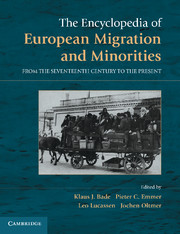Book contents
- Frontmatter
- Contents
- Preface to the English Edition
- Preface to the German Edition
- The Encyclopedia: Idea, Concept, Realization
- Terminologies and Concepts of Migration Research
- Countries
- Northern Europe
- Western Europe
- Great Britain
- Ireland and Northern Ireland
- The Netherlands
- Belgium and Luxembourg
- France
- Central Europe
- Southern Europe
- East-Central Europe
- Southeastern Europe
- Eastern Europe
- APPENDIX
- Index of Migration Types
- Index of Countries, Regions, and Places
- References
France
from Western Europe
Published online by Cambridge University Press: 05 June 2012
- Frontmatter
- Contents
- Preface to the English Edition
- Preface to the German Edition
- The Encyclopedia: Idea, Concept, Realization
- Terminologies and Concepts of Migration Research
- Countries
- Northern Europe
- Western Europe
- Great Britain
- Ireland and Northern Ireland
- The Netherlands
- Belgium and Luxembourg
- France
- Central Europe
- Southern Europe
- East-Central Europe
- Southeastern Europe
- Eastern Europe
- APPENDIX
- Index of Migration Types
- Index of Countries, Regions, and Places
- References
Summary
Immigration to France has a long and fascinating history which has taken on considerable importance since the mid-19th century. Because France was the largest nation in western Europe in the early modern period, internal migration accounted for most human movement that supplied workers and artisans to needy fields, towns, and cities. Moreover, at this time, there was more emigration to France’s colonies in the Americas than immigration from abroad. The Revolution of 1789 opened a period of political immigration to those attracted by French politics and émigré departures by those repelled by revolutionary politics. The postrevolutionary period signaled the beginning of France’s declining birthrate, which was fundamental to the need for immigrant labor in the late 19th and 20th centuries. Three great waves of immigration (ca. 1900, 1920s, and 1960–75) brought unprecedented numbers of immigrants into France. The 20th century, marked by wars, economic crises, xenophobia, the collapse of the empire, and the globalization of migration patterns, created new and varied patterns of immigration and integration.
France and its borders
Compared with other European countries, France has current territorial borders that are are rather old. With the expansionist wars of Louis XIV in the second half of the 17th century as well as during the reign of his successor Louis XV, albeit more slowly, in the middle of the 18th century in the northwest, northeast, and southeast the current borders were set. The large-scale Napoleonic conquests in west, middle, and southern Europe were soon lost with the Congress of Vienna in 1814/15. Savoy and Nice were acquired in 1860 as a reward for the French support of the Italian unification movement. Alsace Lorraine, ceded by France after the war with Prussia in 1870, was recovered after World War I.
- Type
- Chapter
- Information
- The Encyclopedia of European Migration and MinoritiesFrom the Seventeenth Century to the Present, pp. 52 - 62Publisher: Cambridge University PressPrint publication year: 2011
References
- 1
- Cited by



